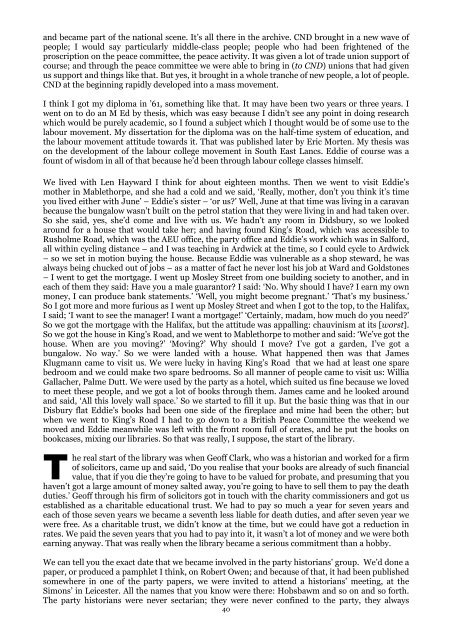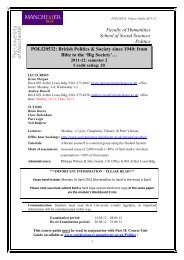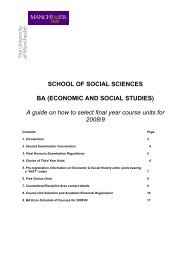CHNN 22, Spring 2008 - School of Social Sciences
CHNN 22, Spring 2008 - School of Social Sciences
CHNN 22, Spring 2008 - School of Social Sciences
You also want an ePaper? Increase the reach of your titles
YUMPU automatically turns print PDFs into web optimized ePapers that Google loves.
and became part <strong>of</strong> the national scene. It’s all there in the archive. CND brought in a new wave <strong>of</strong><br />
people; I would say particularly middle-class people; people who had been frightened <strong>of</strong> the<br />
proscription on the peace committee, the peace activity. It was given a lot <strong>of</strong> trade union support <strong>of</strong><br />
course; and through the peace committee we were able to bring in (to CND) unions that had given<br />
us support and things like that. But yes, it brought in a whole tranche <strong>of</strong> new people, a lot <strong>of</strong> people.<br />
CND at the beginning rapidly developed into a mass movement.<br />
I think I got my diploma in ’61, something like that. It may have been two years or three years. I<br />
went on to do an M Ed by thesis, which was easy because I didn’t see any point in doing research<br />
which would be purely academic, so I found a subject which I thought would be <strong>of</strong> some use to the<br />
labour movement. My dissertation for the diploma was on the half-time system <strong>of</strong> education, and<br />
the labour movement attitude towards it. That was published later by Eric Morten. My thesis was<br />
on the development <strong>of</strong> the labour college movement in South East Lancs. Eddie <strong>of</strong> course was a<br />
fount <strong>of</strong> wisdom in all <strong>of</strong> that because he’d been through labour college classes himself.<br />
We lived with Len Hayward I think for about eighteen months. Then we went to visit Eddie’s<br />
mother in Mablethorpe, and she had a cold and we said, ‘Really, mother, don’t you think it’s time<br />
you lived either with June’ – Eddie’s sister – ‘or us?’ Well, June at that time was living in a caravan<br />
because the bungalow wasn’t built on the petrol station that they were living in and had taken over.<br />
So she said, yes, she’d come and live with us. We hadn’t any room in Didsbury, so we looked<br />
around for a house that would take her; and having found King’s Road, which was accessible to<br />
Rusholme Road, which was the AEU <strong>of</strong>fice, the party <strong>of</strong>fice and Eddie’s work which was in Salford,<br />
all within cycling distance – and I was teaching in Ardwick at the time, so I could cycle to Ardwick<br />
– so we set in motion buying the house. Because Eddie was vulnerable as a shop steward, he was<br />
always being chucked out <strong>of</strong> jobs – as a matter <strong>of</strong> fact he never lost his job at Ward and Goldstones<br />
– I went to get the mortgage. I went up Mosley Street from one building society to another, and in<br />
each <strong>of</strong> them they said: Have you a male guarantor? I said: ‘No. Why should I have? I earn my own<br />
money, I can produce bank statements.’ ‘Well, you might become pregnant.’ ‘That’s my business.’<br />
So I got more and more furious as I went up Mosley Street and when I got to the top, to the Halifax,<br />
I said; ‘I want to see the manager! I want a mortgage!’ ‘Certainly, madam, how much do you need?’<br />
So we got the mortgage with the Halifax, but the attitude was appalling: chauvinism at its [worst].<br />
So we got the house in King’s Road, and we went to Mablethorpe to mother and said: ‘We’ve got the<br />
house. When are you moving?’ ‘Moving?’ Why should I move? I’ve got a garden, I’ve got a<br />
bungalow. No way.’ So we were landed with a house. What happened then was that James<br />
Klugmann came to visit us. We were lucky in having King’s Road that we had at least one spare<br />
bedroom and we could make two spare bedrooms. So all manner <strong>of</strong> people came to visit us: Willia<br />
Gallacher, Palme Dutt. We were used by the party as a hotel, which suited us fine because we loved<br />
to meet these people, and we got a lot <strong>of</strong> books through them. James came and he looked around<br />
and said, ‘All this lovely wall space.’ So we started to fill it up. But the basic thing was that in our<br />
Disbury flat Eddie’s books had been one side <strong>of</strong> the fireplace and mine had been the other; but<br />
when we went to King’s Road I had to go down to a British Peace Committee the weekend we<br />
moved and Eddie meanwhile was left with the front room full <strong>of</strong> crates, and he put the books on<br />
bookcases, mixing our libraries. So that was really, I suppose, the start <strong>of</strong> the library.<br />
T<br />
he real start <strong>of</strong> the library was when Ge<strong>of</strong>f Clark, who was a historian and worked for a firm<br />
<strong>of</strong> solicitors, came up and said, ‘Do you realise that your books are already <strong>of</strong> such financial<br />
value, that if you die they’re going to have to be valued for probate, and presuming that you<br />
haven’t got a large amount <strong>of</strong> money salted away, you’re going to have to sell them to pay the death<br />
duties.’ Ge<strong>of</strong>f through his firm <strong>of</strong> solicitors got in touch with the charity commissioners and got us<br />
established as a charitable educational trust. We had to pay so much a year for seven years and<br />
each <strong>of</strong> those seven years we became a seventh less liable for death duties, and after seven year we<br />
were free. As a charitable trust, we didn’t know at the time, but we could have got a reduction in<br />
rates. We paid the seven years that you had to pay into it, it wasn’t a lot <strong>of</strong> money and we were both<br />
earning anyway. That was really when the library became a serious commitment than a hobby.<br />
We can tell you the exact date that we became involved in the party historians’ group. We’d done a<br />
paper, or produced a pamphlet I think, on Robert Owen; and because <strong>of</strong> that, it had been published<br />
somewhere in one <strong>of</strong> the party papers, we were invited to attend a historians’ meeting, at the<br />
Simons’ in Leicester. All the names that you know were there: Hobsbawm and so on and so forth.<br />
The party historians were never sectarian; they were never confined to the party, they always<br />
40
















